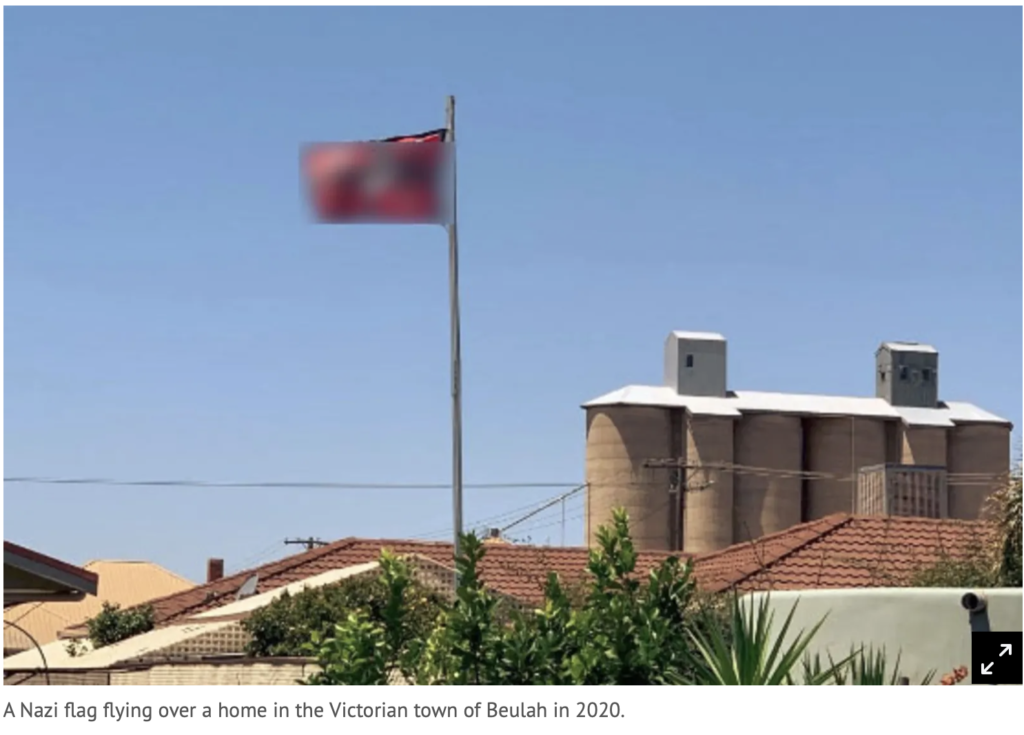Victoria has become Australia’s first state to specifically ban the display of the Nazi swastika.

Under a new law, the Summary Offences Amendment (Nazi Symbol Prohibition) Bill 2022, people who intentionally exhibit the symbol face up to a year in jail or a A$22,000 fine. The bill, hailed as a “thunderous blow” to white supremacists was passed in the Victorian Parliament on 21st June 2022.
The legislation was introduced in May 2022 to Parliament, when deputy opposition leader David Southwick, who is Jewish and has campaigned for the ban for a number of years, urged the government to have the new laws come into effect immediately.
The Bill was passed with bipartisan support.
Ros Spence, Minister for Multicultural Affairs, said, “These laws are part of our unwavering commitment to challenge antisemitism, hatred and racism wherever and whenever they occur.”
Victorian Premier Dan Andrews said “nobody has the right to spread racism, hate or anti-Semitism”. (Statement from Premier’s Department here).
Like many places globally, Australia has seen a sharp rise in anti-Semitic incidents in recent times.
Victoria already has anti-hate speech laws – but they have been criticised for having “gaps”.
A push for reform intensified in 2020 when a couple raised a swastika flag above their home, angering the local community.

State officials called the new legislation a “proud moment”. Three other states have said they will introduce similar laws.
The Nazi swastika has become internationally recognised for representing anti-Semitism and racism after Adolf Hitler adopted it as the Nazi Party symbol in 1920.
“The Nazi symbol glorifies one of the most hateful ideologies in history – its public display does nothing but cause further pain and division,” said Victorian Attorney-General Jaclyn Symes. “It’s a proud moment to see these important laws pass with bipartisan support. I’m glad to see that no matter what side of politics, we can agree that this vile behaviour will not be tolerated in Victoria.”
There are exemptions for showing the symbol in historical, educational and artistic contexts. It can also be used in Hindu, Buddhist and Jain religious contexts, as it has been for millennia, where it represents peace and well-being.
Faith groups in Victoria have welcomed the state government’s decision to pass legislation banning the public display of the Nazi symbol.
Surinder Jain, Vice President of the Hindu Council of Australia says the Bill will help battle public confusion around the difference between the Nazi symbol and the ancient Indian swastika. “Because when we display it people misunderstand it to be the Nazi hate symbol Hakenkreuz – the hooked cross. This Bill makes a clear distinction between the two. It does the right thing by banning the hate symbol. And it does the right thing by exempting sacred symbols used by Hindus, Buddhists and Jains.”
“The bill will help battle public confusion around the difference between the Nazi symbol and the ancient Indian swastika”
(Surinder Jain, Vice President of the Hindu Council of Australia)
Victoria’s Jewish community also welcomed the bill. Chairman of the Anti-Defamation Commission (a Jewish organization founded to fight antisemitism) Dvir Abramovich began campaigning for the ban five years ago. He said a Jewish person being confronted by the Nazi swastika is “as threatening as being confronted by a gun”.
“I think people often forget what the Nazi swastika represents – the final solution. That is, the extermination of six million Jews in gas chambers. It represents the desire by the Third Reich to eliminate every single Jewish person on earth. It is the ultimate emblem of evil”.
Andy Meddick MP, addressing the Victorian Parliament, said: ‘This Bill today is not just about a symbol but about an ideology that took an ancient and respected symbol, perverted it, warped it and desecrated it so deeply that the world has come to see it almost exclusively as a symbol of a regime of such deep rooted hatred, murder, rape, genocide, and acts so vile that it’s hard to believe the human species could be capable of them”.
People will be prosecuted only if they defy a first request to remove the symbol.
Anti-Defamation Commission chairman Dvir Abramovich – who campaigned for the law – called it a “thunderous blow” to the neo-Nazi movement.
“As our nation confronts the deep stain of a resurgent white-supremacist movement that peddles a dangerous and dehumanising agenda, this parliament has declared that the symbol of Nazism will never find a safe harbour in our state,” he told the Australian Broadcasting Corporation.
The number of anti-Semitic incidents around the world dramatically increased last year, according to a study by Tel Aviv University. Australia had 88 in one month alone – a national record.
In 2020, Australia’s intelligence chief warned of a “real threat” to the country’s security from neo-Nazis. He said “small cells” of right-wing extremists were meeting regularly to salute Nazi flags and share their ideology.
Since the pandemic began, unions and others have also accused far-right groups of “infiltrating” large protests about lockdowns and other restrictions.
The new laws will come into effect in six months to allow for a campaign about the origins of the religious and cultural swastika to be rolled out. The government says it has brought forward the date when the legislation will come into effect, originally planned to take 12 months, based on feedback from religious, legal and community groups.